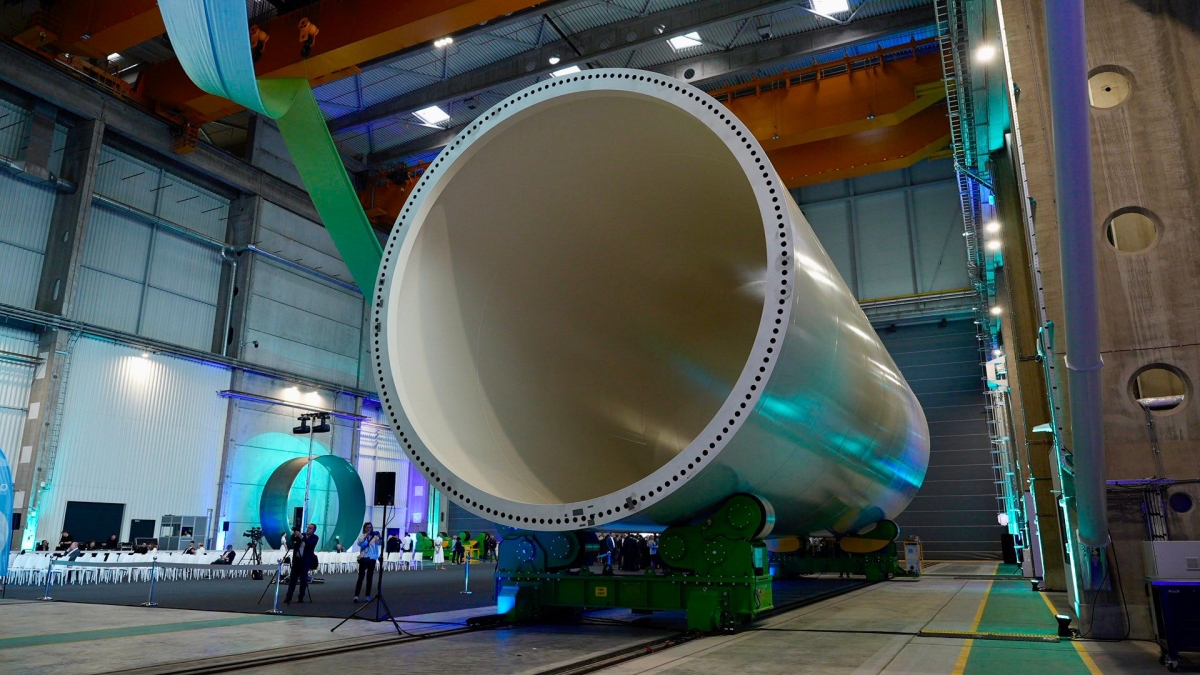
On Thursday, invited guests gathered at the Baltic Towers factory on Ostrów Island in Gdańsk to celebrate the production of the first components for offshore wind towers. The occasion was symbolic – the plant, which has the potential to become one of the key hubs on the European offshore map, is operational, but the company still faces further challenges.
On September 18, around noon, guests were welcomed in one of the factory halls by the symbol of the ceremony – the first manufactured component of an offshore wind tower. Several hundred visitors had the opportunity to see massive elements, each 8 meters in diameter and about 35 meters long, produced for the Danish giant Vestas. Three such tower sections were displayed in the hall set up for the event, while production continued in other parts of the facility, clearly audible during the celebration. Each section manufactured at Baltic Towers weighs between 300 and 500 tons and, depending on project complexity and specification, is produced within 10–12 weeks.
Although the official purpose of the event was to mark the production of the first tower component, in reality, it symbolized the completion of one stage of the project – the investment phase.
“We have now entered a new stage, which is no less of a challenge than building the plant itself – the production phase. We went through the entire process with the first product: receiving the raw materials, cutting the steel plates, welding and rolling them into sections, assembling, conducting all quality inspections, painting, and equipping the section. We confirmed that all specialized machinery functions properly and that the project assumptions are sound. From now on, the task is to reach full production capacity and complete our hiring plan. We currently employ 200 people, with a target of 500 by the end of 2026, when we expect to achieve full capacity. This is a natural learning curve – both in terms of recruitment and training – for any new manufacturing plant. Our ambitious goal is to achieve full-scale production as quickly as possible while meeting the high expectations of our customers,” said Jakub Wnuczyński, CEO of Baltic Towers, in an interview with Gospodarka Morska.
The ceremony gathered numerous representatives of national and local authorities, including Minister of Climate and Environment Paulina Hennig-Kloska, Pomeranian Voivode Beata Rutkiewicz, Marshal of the Pomeranian Voivodeship Mieczysław Struk, and Mayor of Gdańsk Aleksandra Dulkiewicz. Shareholders of Baltic Towers were also represented: the Polish Industrial Development Agency (ARP) by vice-presidents Ilona Deręgowska and Marek Zaleśny, and Spain’s GRI Renewable Industries by owner Jon Riberas and CEO Antonio Barbosa, who traveled from Spain for the occasion. Spain’s Deputy Head of Mission in Poland, Miguel Garcia-Herraiz, was also present.
After speeches highlighting Baltic Towers’ role in Poland’s and Europe’s energy transition, regional economic growth, and offshore supply chain development, an official ribbon-cutting ceremony was held, formally opening the factory.
“For us, as a company, this is a huge step – we are investing nearly EUR 200 million in this impressive facility and are deeply committed to developing towers for offshore wind farms and advancing the offshore energy sector. This is therefore a very important milestone. As a group, we operate 200 plants in 28 countries, five of which are in Poland, making this a strategically important market. Being here today, after 15 months of work on creating this 62,000-square-meter facility and its infrastructure, makes me very happy and proud of what we have achieved,” emphasized Jon Riberas, owner of GRI Renewable Industries.
The importance of Baltic Towers for Poland’s industrial development and energy ambitions was also highlighted by Climate and Environment Minister Paulina Hennig-Kloska. She stressed that Poland must reduce not only its dependence on imported energy resources but also its reliance on imported technologies critical to renewable energy projects.
“Building factories here in Poland and in Europe, ensuring the continent is not vulnerable to blackmail from third countries, is extremely important. We create trends, good legislation, and provide capital support. Without government backing, this sector would likely develop, but at a slower pace. Good investment conditions – from legal stability to financing and business climate – are essential to attract investors, build consortia with Polish capital, and encourage Polish companies to take risks and expand into new areas. I am convinced that Poland will become a leader in manufacturing such components for renewable energy,” said Minister Hennig-Kloska.
For Baltic Towers, the immediate priorities include hiring and training staff, as well as optimizing production processes.
“In the coming years, this will be an ongoing effort to refine operations. The path to full production capacity will be a period of intense work for the entire team. We are not only building a plant from the ground up, but also creating an organization with systems, regulations, solutions, and a culture that will remain here for years to come – a culture of efficient, respectful, and professional work focused on delivering every component to the satisfaction of our clients,” added CEO Wnuczyński.
The launch of Baltic Towers is also a significant milestone for the economic transformation of Pomerania, driven by the emerging offshore wind sector in Poland.
“Producing such components requires building an extensive supply chain. This factory is a major economic driver for the shipbuilding-adjacent industry, but also for many companies not previously linked to large-scale steel structures. It is a huge opportunity for numerous firms in the Pomeranian region, employing hundreds of highly skilled and well-paid specialists. Given current offshore supply chain dynamics, it is increasingly realistic to say that major turbine manufacturers such as Vestas and Siemens Gamesa – and possibly others – will soon not be able to operate without the products made here in Gdańsk,” noted Jakub Budzyński, President of the Polish Offshore Wind Energy Society.


